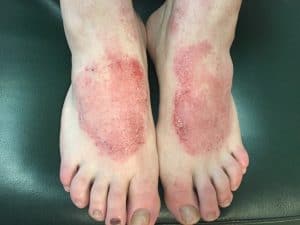
Tattoos and Eczema

You will want to address any concerns you have about getting a tattoo with your dermatologist before heading out to the tattoo parlor. Many tattoo artists will offer to do a test tattoo to see if you react to the ink.
While eczema, also known as atopic dermatitis, is a chronic condition, the symptoms can lay dormant for months or years. A flare-up may be preceded by itchiness and redness. If you are experiencing these symptoms you will want to reschedule your tattoo appointment. You can reschedule once your flare-up has completely passed.
Tattoos and an Increased Risk with Eczema
Eczema is a condition of the autoimmune system. It often will flare-up when the immune system kicks into overdrive. Although Eczema may develop as a child, but sometimes in adults later. Additionally, there seems to be a genetic factor as eczema tends to run in families. Common triggers include:
- acute illnesses
- air pollution
- chemical exposure
- environmental allergies
There are some risks inherent with getting a tattoo. The risks of these side effects increase if you suffer from eczema or another preexisting skin condition. Your skin is already sensitive when you have skin conditions such as psoriasis. A tattoo can make this sensitivity even worse.
 Possible Side Effects of Tattoos and Eczema
Possible Side Effects of Tattoos and Eczema
What can happen if I get a tattoo? Those that have eczema have a higher chance of experiencing skin reactions due to their hypersensitivity. These reactions may include:
- an eczema flare-up (increased itching and redness)
- an increase in itchiness during the healing process
- scarring from improper healing
- a rare allergic reaction to the ink used for the tattoo
- development of an infection
- hyper- or hypopigmentation (change to skin color)
- appearance of keloids (large, raised scars)
Some people get tattoos to cover scars from a previous eczema flare-up. Having a tattoo done over a scar increases the risk of hyper- or hypopigmentation. It can also contribute to the development of keloids.
Can eczema be impacted by a tattoo?
Any reaction to a tattoo is always possible, especially if it is not properly cared for. It’s a given that the majority of people who get tattoos are men, but there are women who get tattoos too. Compared to the majority of people who don’t have skin issues, your skin is more likely to respond. Eczema can make getting a tattoo problematic at times.
It should be noted that people with eczema can absolutely have tattoos, and there are countless cases of people who got tattoos and were completely fine thereafter despite having this skin problem. Eczema can make getting a tattoo problematic at times.
Also, if you have eczema scars and believe getting tattooed would be a great method to cover them up, you might be in for a shock. It’s usually advised to stay away from sensitive places where there are scars because doing so can make your flare-ups worse.
Before having a tattoo, a dermatologist should be consulted because eczema and tattoos could have an adverse effect on the skin.
Is there sensitive skin-specific ink?
There are inks that can be better for skin that is sensitive or has disorders like eczema.
When you have your tattoo consultation or chat online with your tattoo artist, try to make a point of discussing this with them, it could be that they have to source this specifically, but it is worth it if you are going to get a tattoo and you are worried that the ink could irritate some areas of your body.
Restoration & Care for the New Tattoo
So how do you take care of your tattoo after getting it? For the first few weeks after getting a tattoo, it basically just looks like a wound since the needles leave the desired color inside while leaving marks on the skin.

 Possible Side Effects of
Possible Side Effects of